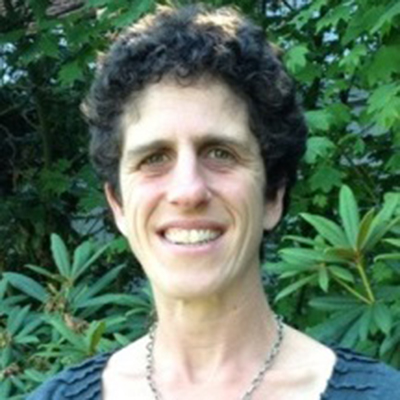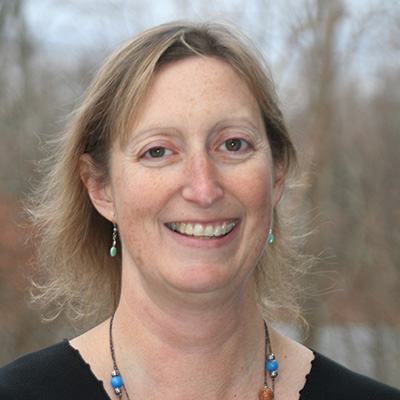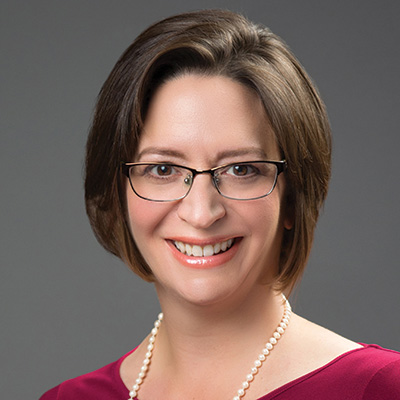Honors for Loertscher, Munson, Serio
Loertscher awarded fellowship
Seattle University named Jenny Loertscher a recipient of the James B. McGoldrick, S.J., Fellowship. This award is given to outstanding faculty who exemplify “Seattle University’s Jesuit educational mission,” according to the SeattleU website. It is the most prestigious honor the university confers upon its faculty.

Loertscher is an associate dean of science and engineering and a professor of chemistry at Seattle. Her research is focused on understanding and improving student learning in undergraduate chemistry and biochemistry. Specifically, she is interested in how classroom practices influence students’ understanding of foundational concepts in biochemistry and their ability to work together and analyze complex problems. She is a coauthor of an active learning biochemistry textbook titled “Foundations of Biochemistry.”
Loertscher serves on the ASBMB Education and Professional Development Committee as well as the Accreditation and Exam Subcommittee. She has also written education articles for ASBMB Today. In 2017, she won Seattle U’s Provost Award for Teaching.
A press release described Loertscher as a “rare academic who is recognized not only for proficiency in her academic discipline … (and) a national leader in pedagogical innovation.”
Munson to lead cell biology society
Mary Munson, a professor in the biochemistry and molecular biotechnology department at the University of Massachusetts Chan Medical School, was recently elected president of the American Society for Cell Biology, or ASCB. She is set to become president-elect of the group’s executive committee in 2024.

Munson was named assistant vice provost of health equity on her campus earlier this year. She also has been faculty advisor for UMass Chan’s student chapter of the Society for Advancement of Chicanos/Hispanics and Native Americans in Science, or SACNAS, a leader in her department’s Diversity Action Committee and a trained facilitator for the Entering Mentoring and Restorative Justice programs. In 2022, she received the Chancellor's Award for Advancing Institutional Excellence in Diversity and Inclusion.
The Munson lab studies the regulation of membrane trafficking, the flow of material between the plasma membrane bounding a cell and the cell’s inner components. The team probes the control of exocytosis, the orderly fusion of secretory vesicles with the cell membrane. Another research focus is the link between severe congenital neutropenia (a dangerously low count of white blood cells known as neutrophils) and mutations in VPS45, a critical regulator of the endocytosis pathway.
Munson served on the Journal of Biological Chemistry editorial board from 2017 to 2022. She is co-chair of the ASCB’s Women in Cell Biology committee and a co-investigator of the society’s Maximizing Opportunities for Scientific and Academic Independent Careers, or MOSAIC, program for select K99/R00 scholars. She was elected in 2022 as a fellow of the ASCB.
Serio appointed provost and VP
Tricia Serio has been named provost and executive vice president for academic affairs at the University of Washington. She began her duties on Aug. 1, at which time she became a faculty member at the UW School of Medicine. Serio was previously the provost, senior vice chancellor for academic affairs and a professor of biochemistry and molecular biology at the University of Massachusetts Amherst.

Serio will move her lab to UW later this year. Her research focuses on the cellular regulation of self-perpetuating protein conformations in yeast and the pathogenesis of severe neurodegenerative diseases. She has earned numerous honors including the Howard Temin Award from the National Cancer Institute and the Mid-Career Award for Research Excellence from the American Society of Cell Biology. Serio is a fellow of the American Association for the Advancement of Science.
Outside of the lab at UMass, Serio led initiatives to increase diversity, equity and inclusion for faculty, staff and students. She promoted faculty scholarship and creative activities focused on sustainability, healthy aging, society and technology, inclusive excellence, data science and mid-career research leaves. As a member of the American Society for Biochemistry and Molecular Biology Public Affairs Advisory Committee, she advocated for research funding, workforce equity and science literacy.
In a press release from UW, Serio said, “I have long admired the University of Washington for its focus on excellence, and I am excited to partner with (UW) President (Ana Mari) Cauce and the faculty, staff and students to support the individual and collective aspirations that define its impact in the world.”
Enjoy reading ASBMB Today?
Become a member to receive the print edition four times a year and the digital edition monthly.
Learn moreGet the latest from ASBMB Today
Enter your email address, and we’ll send you a weekly email with recent articles, interviews and more.
Latest in People
People highlights or most popular articles

Embrace your neurodivergence and flourish in college
This guide offers practical advice on setting yourself up for success — learn how to leverage campus resources, work with professors and embrace your strengths.

Survival tools for a neurodivergent brain in academia
Working in academia is hard, and being neurodivergent makes it harder. Here are a few tools that may help, from a Ph.D. student with ADHD.

Quieting the static: Building inclusive STEM classrooms
Christin Monroe, an assistant professor of chemistry at Landmark College, offers practical tips to help educators make their classrooms more accessible to neurodivergent scientists.

Hidden strengths of an autistic scientist
Navigating the world of scientific research as an autistic scientist comes with unique challenges —microaggressions, communication hurdles and the constant pressure to conform to social norms, postbaccalaureate student Taylor Stolberg writes.

Richard Silverman to speak at ASBMB 2025
Richard Silverman and Melissa Moore are the featured speakers at the ASBMB annual meeting to be held April 12-15 in Chicago.

Women’s History Month: Educating and inspiring generations
Through early classroom experiences, undergraduate education and advanced research training, women leaders are shaping a more inclusive and supportive scientific community.
